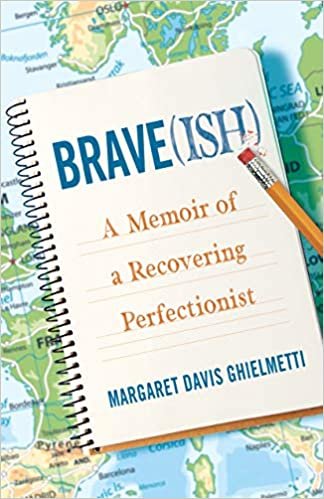Book Review: Brave(ish)
Brave(ish). Margaret Davis Ghielmetti. She Writes Press, September 15, 2020, Trade Paperback and E-book, 248 pages.
Reviewed by Dipika Mukherjee.
Margaret Davis Ghielmetti’s memoir, Brave(ish), is perfect for reading through the pandemic. Ghielmetti is a skilled storyteller who takes the confined reader out of a single room, straight out of the country, and into a journey around the world. And what a spectacular journey it is! Through Ghielmetti’s eyes, we luxuriate in the opulence of luxury hotels and resorts in Paris, Cairo, Sharm el Sheik, Chiang Mai, Bangkok, Singapore, and India, before bringing us back to Illinois.
The words of the prologue are fraught with the delicious danger of straying into the unknown, as well as the primal fear all expatriates grapple with as they head for an unfamiliar culture in a faraway country:
So yes: we’re off, and I’ve got this!
I think I’ve got this.
I’ve got this, right?
Brave(ish) is the story of a woman, who at 40, quits her sales job in Chicago to become a trailing spouse while her husband blazes through a hotel career around the world. Everyone tells her she is living a dream, and often she feels lucky but inadequately grateful for that good fortune. She drifts into alcohol dependency, adrift from any professional identity, and far from all that is familiar. She does not ask for help, and when it is given, she accepts with reluctance:
Then I crumple, sniffling in the back seat of the van. Our driver—without a word—goes to buy me a bottle of cold water at a tourist kiosk by the entrance to the monastery. He hands me a sandwich of pita bread and hummus . . . I open my mouth to protest, but he shakes his head and smiles at me, saying. “Eat, Madaam, Rest.” This is the hospitality of this country: an Egyptian will literally give you the shirt off his back (or the sandwich out of his lunch box).
Brave(ish) is filled with such courtesies, small and large. Ghielmetti is unfailingly gracious not only to the host country's population but also towards friends who visit. She feels guilty about turning away any guests and her distance from aging parents.
Being an expatriate in challenging, but very few of the intercultural tensions come through in this book. There is not even a whiff of political upheaval, although we travel through Egypt, Thailand, and India. The effect is of being led on a luxurious journey—like a ride on the Oriental Express—with the heat and dust very far away, outside.
Ghielmetti is unflinchingly honest about her struggles with inner demons. She finds God in an early epiphany, and the voice of God recurs through her battle with alcohol and the strain to rediscover her purpose in life. When she returns to Evanston and deals with her parents' death, she is very conscious of what has changed about her sense of self:
I remind myself how other former expatriates had warned me that the biggest culture shock is upon return to the home country . . . I am happy to be back, but that's not how I see the world. I determine to consider this move back to the US as adjusting to yet another "new" culture.
Overall, this is a beautifully written travelogue about losing yourself through journeying, then finding your strength within. There is much to learn from this slim book, both linguistically and culturally.
Brave(ish) is a gorgeous, meditative book.

